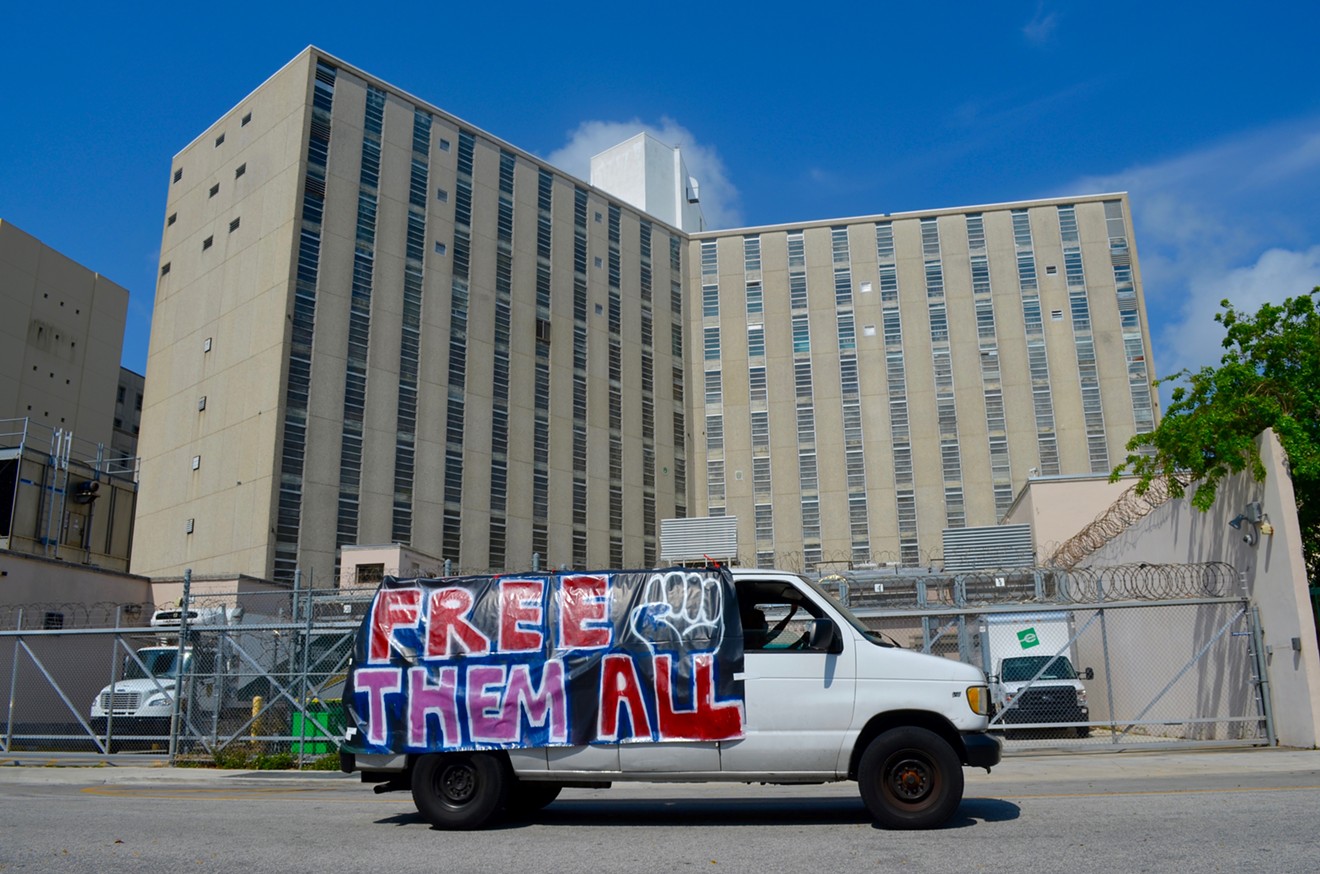The socially distanced protest was part of a multipronged campaign by civil rights advocates to free inmates because of unsafe and unsanitary conditions inside Miami-Dade County jails.
Gutierrez's son's father is due to be released from the Metro West Detention Center at the end of May. He has allergy-induced asthma, and Gutierrez worries he will contract COVID-19 before returning home to see their son.
"He was sentenced to a year," she says. "I don't want to get that call that says, 'Come claim this body.'"
Earlier this month, five civil rights groups filed a lawsuit against Miami-Dade Corrections and Rehabilitation for failing to properly respond to the threat of COVID-19 at Metro West.
U.S. District Judge Kathleen Williams has since ordered two independent examiners to inspect the jail before this Saturday, April 18, and to document the conditions inside, including cleanliness, availability of disinfecting supplies, and enforcement of social-distancing practices. Another court hearing has been scheduled for April 27.
Anthony Swain, one of the plaintiffs in the lawsuit, is a 43-year-old paraplegic with multiple health issues. He has been awaiting trial at Metro West for four years on charges related to an alleged pill mill operation, to which he has pleaded not guilty. His parents, Connie and Anthony Swain, joined protesters Tuesday.
"Our son's illness affects his spinal cord and diaphragm," Connie Swain says. "At any point, he could stop breathing. And yet they have him in a contaminated area where people have been testing positive for coronavirus."
In a statement to New Times, a spokesperson for Miami-Dade Corrections says three inmates and 45 staff members at county jail facilities have tested positive for COVID-19. No inmates at Metro West have tested positive. The department says it is encouraging staff to get tested; Corrections Health Services is providing tests for inmates with symptoms of the disease."I don't want to get that call that says, 'Come claim this body.'"
tweet this
The department says the allegations in the lawsuit do not reflect the proactive steps it has already taken to protect the health and well-being of its employees and inmates. Its efforts to manage the coronavirus crisis include canceling inmate visitation, screening anyone who enters facilities, providing protective equipment, and sanitizing the facilities, according to a spokesperson. The department is practicing social distancing but says that when contact is "inevitable due to the correctional environment," it is limited to "the shortest duration possible and no longer than ten minutes."
However, some advocates say not enough is being done to stop the spread of the virus. Maya Ragsdale, a lawyer with the advocacy group Dream Defenders and a former public defender, has been in touch with inmates at Metro West who say they want tests to be made available so infected detainees can be quarantined and treated.
"It doesn't seem like they are doing any routine or regular testing within the jails," Ragsdale says. "No one I've talked to has been tested, and no one knows anyone who has been tested. Even someone I spoke to was coughing up blood and wasn't tested."
Miami-Dade State Attorney Katherine Fernandez Rundle pledged to develop a process to release misdemeanor and nonviolent defendants after she was criticized for her slow response at the beginning of the coronavirus crisis. Her office first said prosecutors had no control over reducing arrests and then reversed that claim after receiving an open letter from 18 activist and civil rights groups.
Among Rundle's critics is Melba Pearson, her former employee and current opponent in the upcoming election for state attorney. Pearson is running on a platform that includes bail reform and anti-corruption and accountability measures. She attended the protest in support of the activists.
"I believe that [Rundle] has not gone far enough," Pearson tells New Times. "I am not calling on her to compromise public safety. I think we can cut our jail population by 50 percent, and then those who are charged with violent charges should have a hearing."
Ed Griffith, a spokesperson for Rundle, says the county jail population has decreased by 17 percent since January because of his boss' efforts. On average, 4,000 people are held in Miami-Dade jails per day. As of yesterday, 3,303 people were in custody.
"We have been working with Miami-Dade's public defender, Carlos Martinez; private attorneys; and the courts to facilitate the release of some individuals accused of nonviolent crimes," Griffith says.
He says the State Attorney's Office has helped release more than 100 individuals who were awaiting trial and 18 who were nearing the end of their sentences. Prosecutors have encouraged arrest alternatives, according to Griffith, and worked to transfer people who are held in Miami-Dade jails for out-of-county matters.
He says that, according to a breakdown from the corrections department, almost 2,000 of the remaining inmates in custody have been charged with the most serious types of violent crimes.
"Releasing these violent individuals back into the community would potentially expose residents of Miami-Dade County to additional violence, harm, and even death," Griffith says.
But Ragsdale believes the State Attorney's Office is dragging its feet and is justifying its inaction by highlighting violent offenders. And she questions the data provided by Griffith about those who remain in jail.
"To say that everyone left in there is a violent offender is just not true," Ragsdale says. "I check the records of the inmates I talk to, so I know that's not the reality. I've had clients that were incarcerated because they couldn't afford the $50 or $100 to bond out."
More than 70 percent of county inmates are awaiting trial, meaning they have not yet been convicted of a crime. (F)empower, a social justice collective that organized Tuesday's drive-by protest with Dream Defenders, is raising money to bail out at-risk detainees and provide them with housing. So far, the group has received $13,000 and bailed out ten people; it plans to release ten more defendants this week.
In addition to her concern for county inmates, Pearson says the new coronavirus is a public health issue for correctional officers who risk being exposed.
"You also have to think about corrections officers and staff who work in there and come out every single day," she says. "They go back home to their families and communities. They go to the grocery store. That's not flattening the curve. More needs to be done."
Connie and Anthony Swain hope the lawsuit and pressure from activists will lead to the release of their son.
"He has been incarcerated for four long years, and they still haven't found him guilty of anything," Connie Swain says. "He has witnessed a number of [incarcerated] people die in front of him before the threat of COVID-19. How many people will die in front of him now?"













